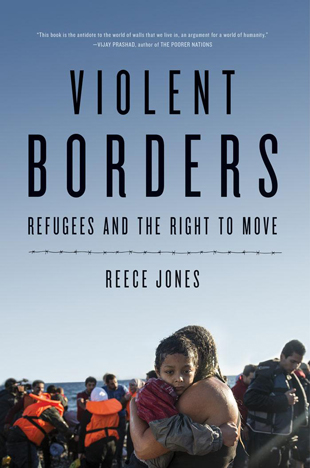

Drawing on field research in border regions around the world, Violent Borders: Refugees and the Right to Move offers a provocative look at the high cost of border security projects and the dire consequences of these projects for countless migrants. Written by Reece Jones, associate professor from the geography department at the University of Hawaiʻi at Mānoa’s College of Social Sciences, the book crosses the migrant trails of the world and provides a timely analysis of the changing roles and the impacts of borders.
According to Jones, the growth of borders and resource enclosures, and the deaths of migrants in search of a better life are intimately connected to climate change, environmental degradation and the growth of global wealth inequality.
“While the poor are restricted by the lottery of birth to slum dwellings in the aftershocks of decolonization, the wealthy travel without constraint, exploiting pools of cheap labor and lax environmental regulations,” said Jones. “Forty thousand people died trying to cross international borders in the past decade, with the high-profile deaths along the shores of Europe only accounting for half of the grisly total. These deaths are not exceptional, but rather the result of state attempts to contain populations and control access to resources and opportunities. We may live in an era of globalization, but much of the world is increasingly focused on limiting the free movement of people.”
How to address inequality and violence perpetuated by borders
Listed as one of the Boston Globe’s 20 must-read non-fiction books for this fall, Violent Borders addresses the deeper causes of the world’s migration crisis and recommendations for how to address the inequality and violence that are perpetuated by borders. These recommendations include:
- Create a humane and fair system for refugees to apply for asylum closer to their home country. Many of the deaths at borders were preventable if there had been a safe system for lodging an asylum petition that did not require setting foot in the European Union or United States.
- Establish global standards for wages and working conditions that would slow the outsourcing of American jobs while improving the lives of workers in many poor countries.
- Recognize movement as a human right. The United Nations Declaration of Human Rights already protects freedom of movement inside individual countries, but not between countries.
More about Reece Jones

Jones’s research on border security and violence has been featured in dozens of media outlets around the world including the New York Times, Time Magazine and the Economist. In addition to Violent Borders: Refugees and the Right to Move, he authored Border Walls: Security and the War on Terror in the United States, India and Israel (2012, Zed Books), which won the 2013 Julian Minghi Distinguished Book Award for best book in political geography from the Association of American Geographers.
He also edited Placing the Border in Everyday Life with Corey Johnson (2014, Ashgate Border Regions Series), which won the Past Presidents’ Gold Book Award from the Association of Borderlands Studies. He is the forum and review editor at the journal Geopolitics and also sits on the editorial board of Political Geography.
—By Lisa Shirota

